POL 298B: EU Economic Regionalism Weakness & Financial Crisis Impact
VerifiedAdded on 2023/04/08
|9
|2872
|474
Essay
AI Summary
This essay examines the weaknesses in the European Union's approach to economic regionalism, particularly as exposed by the global financial crisis and its aftermath. It discusses how the crisis revealed imbalances in trade, the shortcomings of the EU's foreign policy, and the lack of political integration within the Eurozone. The essay further analyzes the impact of the crisis on European trade, highlighting the disproportionate effect on new member states and the challenges faced by industries. It also explores the borrowing responses of various countries and the impact of the financial crisis on the euro adoption strategy. The document concludes by reflecting on the lessons learned for other economic regions, emphasizing the importance of addressing trade imbalances and fostering greater economic and political integration. Desklib provides access to this essay and numerous other resources for students.
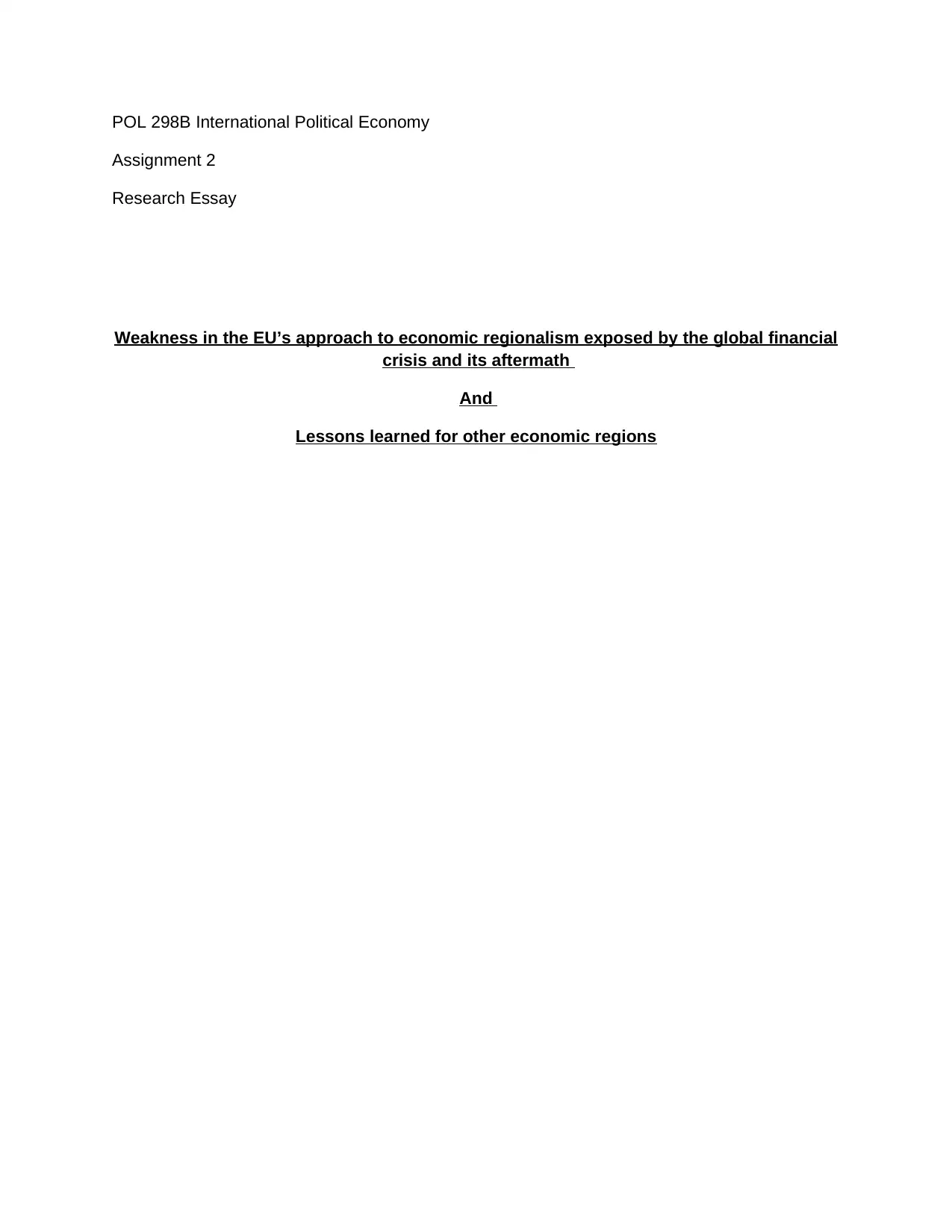
POL 298B International Political Economy
Assignment 2
Research Essay
Weakness in the EU’s approach to economic regionalism exposed by the global financial
crisis and its aftermath
And
Lessons learned for other economic regions
Assignment 2
Research Essay
Weakness in the EU’s approach to economic regionalism exposed by the global financial
crisis and its aftermath
And
Lessons learned for other economic regions
Paraphrase This Document
Need a fresh take? Get an instant paraphrase of this document with our AI Paraphraser
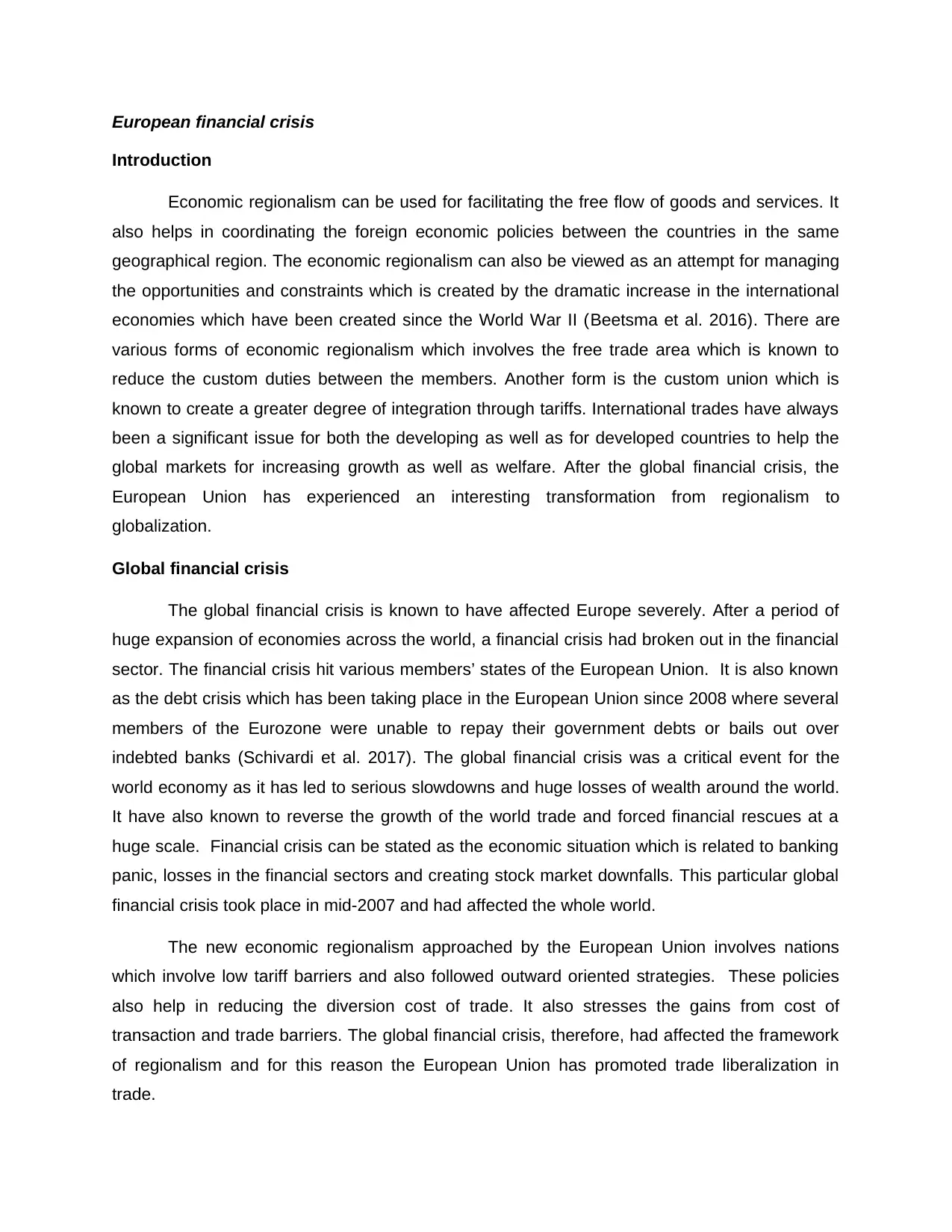
European financial crisis
Introduction
Economic regionalism can be used for facilitating the free flow of goods and services. It
also helps in coordinating the foreign economic policies between the countries in the same
geographical region. The economic regionalism can also be viewed as an attempt for managing
the opportunities and constraints which is created by the dramatic increase in the international
economies which have been created since the World War II (Beetsma et al. 2016). There are
various forms of economic regionalism which involves the free trade area which is known to
reduce the custom duties between the members. Another form is the custom union which is
known to create a greater degree of integration through tariffs. International trades have always
been a significant issue for both the developing as well as for developed countries to help the
global markets for increasing growth as well as welfare. After the global financial crisis, the
European Union has experienced an interesting transformation from regionalism to
globalization.
Global financial crisis
The global financial crisis is known to have affected Europe severely. After a period of
huge expansion of economies across the world, a financial crisis had broken out in the financial
sector. The financial crisis hit various members’ states of the European Union. It is also known
as the debt crisis which has been taking place in the European Union since 2008 where several
members of the Eurozone were unable to repay their government debts or bails out over
indebted banks (Schivardi et al. 2017). The global financial crisis was a critical event for the
world economy as it has led to serious slowdowns and huge losses of wealth around the world.
It have also known to reverse the growth of the world trade and forced financial rescues at a
huge scale. Financial crisis can be stated as the economic situation which is related to banking
panic, losses in the financial sectors and creating stock market downfalls. This particular global
financial crisis took place in mid-2007 and had affected the whole world.
The new economic regionalism approached by the European Union involves nations
which involve low tariff barriers and also followed outward oriented strategies. These policies
also help in reducing the diversion cost of trade. It also stresses the gains from cost of
transaction and trade barriers. The global financial crisis, therefore, had affected the framework
of regionalism and for this reason the European Union has promoted trade liberalization in
trade.
Introduction
Economic regionalism can be used for facilitating the free flow of goods and services. It
also helps in coordinating the foreign economic policies between the countries in the same
geographical region. The economic regionalism can also be viewed as an attempt for managing
the opportunities and constraints which is created by the dramatic increase in the international
economies which have been created since the World War II (Beetsma et al. 2016). There are
various forms of economic regionalism which involves the free trade area which is known to
reduce the custom duties between the members. Another form is the custom union which is
known to create a greater degree of integration through tariffs. International trades have always
been a significant issue for both the developing as well as for developed countries to help the
global markets for increasing growth as well as welfare. After the global financial crisis, the
European Union has experienced an interesting transformation from regionalism to
globalization.
Global financial crisis
The global financial crisis is known to have affected Europe severely. After a period of
huge expansion of economies across the world, a financial crisis had broken out in the financial
sector. The financial crisis hit various members’ states of the European Union. It is also known
as the debt crisis which has been taking place in the European Union since 2008 where several
members of the Eurozone were unable to repay their government debts or bails out over
indebted banks (Schivardi et al. 2017). The global financial crisis was a critical event for the
world economy as it has led to serious slowdowns and huge losses of wealth around the world.
It have also known to reverse the growth of the world trade and forced financial rescues at a
huge scale. Financial crisis can be stated as the economic situation which is related to banking
panic, losses in the financial sectors and creating stock market downfalls. This particular global
financial crisis took place in mid-2007 and had affected the whole world.
The new economic regionalism approached by the European Union involves nations
which involve low tariff barriers and also followed outward oriented strategies. These policies
also help in reducing the diversion cost of trade. It also stresses the gains from cost of
transaction and trade barriers. The global financial crisis, therefore, had affected the framework
of regionalism and for this reason the European Union has promoted trade liberalization in
trade.
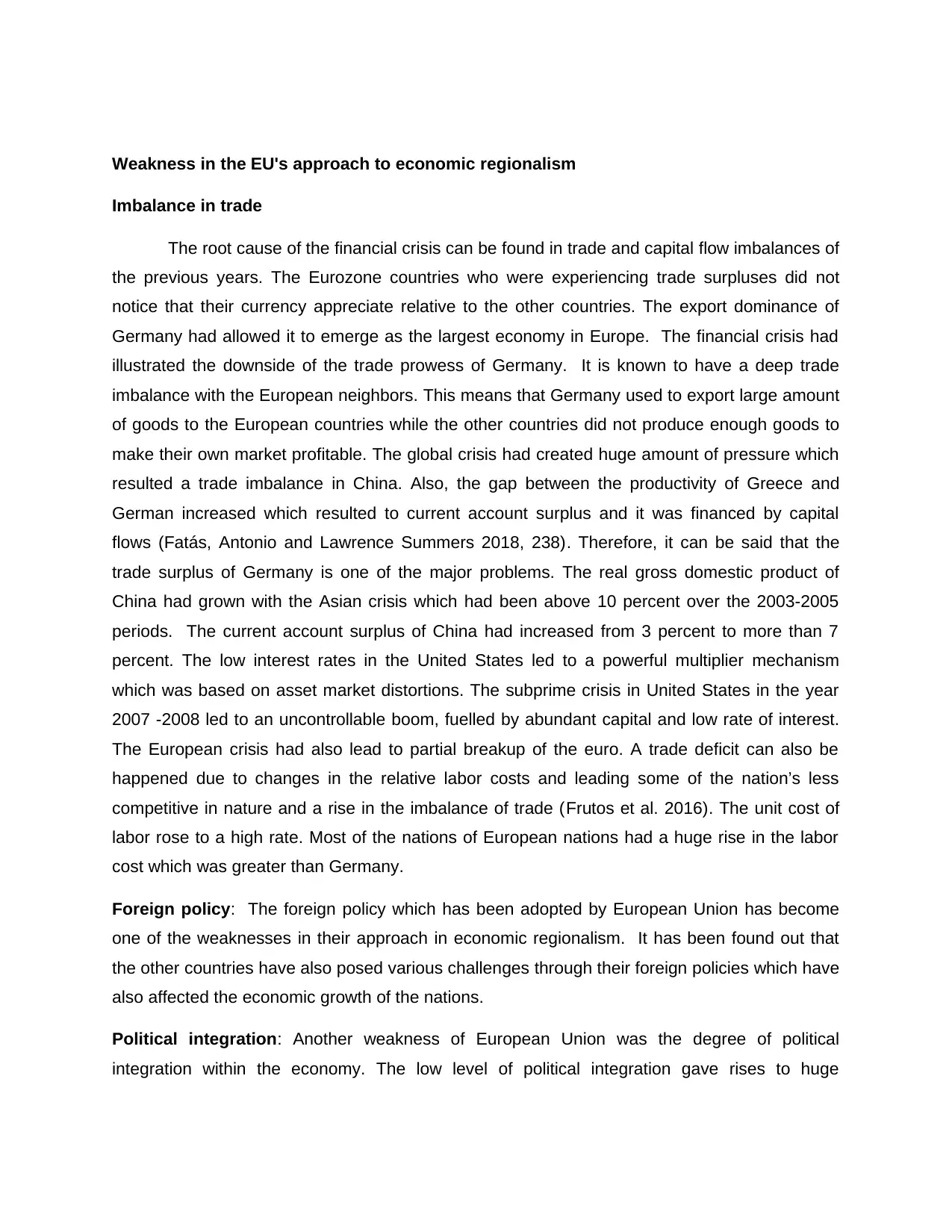
Weakness in the EU's approach to economic regionalism
Imbalance in trade
The root cause of the financial crisis can be found in trade and capital flow imbalances of
the previous years. The Eurozone countries who were experiencing trade surpluses did not
notice that their currency appreciate relative to the other countries. The export dominance of
Germany had allowed it to emerge as the largest economy in Europe. The financial crisis had
illustrated the downside of the trade prowess of Germany. It is known to have a deep trade
imbalance with the European neighbors. This means that Germany used to export large amount
of goods to the European countries while the other countries did not produce enough goods to
make their own market profitable. The global crisis had created huge amount of pressure which
resulted a trade imbalance in China. Also, the gap between the productivity of Greece and
German increased which resulted to current account surplus and it was financed by capital
flows (Fatás, Antonio and Lawrence Summers 2018, 238). Therefore, it can be said that the
trade surplus of Germany is one of the major problems. The real gross domestic product of
China had grown with the Asian crisis which had been above 10 percent over the 2003-2005
periods. The current account surplus of China had increased from 3 percent to more than 7
percent. The low interest rates in the United States led to a powerful multiplier mechanism
which was based on asset market distortions. The subprime crisis in United States in the year
2007 -2008 led to an uncontrollable boom, fuelled by abundant capital and low rate of interest.
The European crisis had also lead to partial breakup of the euro. A trade deficit can also be
happened due to changes in the relative labor costs and leading some of the nation’s less
competitive in nature and a rise in the imbalance of trade (Frutos et al. 2016). The unit cost of
labor rose to a high rate. Most of the nations of European nations had a huge rise in the labor
cost which was greater than Germany.
Foreign policy: The foreign policy which has been adopted by European Union has become
one of the weaknesses in their approach in economic regionalism. It has been found out that
the other countries have also posed various challenges through their foreign policies which have
also affected the economic growth of the nations.
Political integration: Another weakness of European Union was the degree of political
integration within the economy. The low level of political integration gave rises to huge
Imbalance in trade
The root cause of the financial crisis can be found in trade and capital flow imbalances of
the previous years. The Eurozone countries who were experiencing trade surpluses did not
notice that their currency appreciate relative to the other countries. The export dominance of
Germany had allowed it to emerge as the largest economy in Europe. The financial crisis had
illustrated the downside of the trade prowess of Germany. It is known to have a deep trade
imbalance with the European neighbors. This means that Germany used to export large amount
of goods to the European countries while the other countries did not produce enough goods to
make their own market profitable. The global crisis had created huge amount of pressure which
resulted a trade imbalance in China. Also, the gap between the productivity of Greece and
German increased which resulted to current account surplus and it was financed by capital
flows (Fatás, Antonio and Lawrence Summers 2018, 238). Therefore, it can be said that the
trade surplus of Germany is one of the major problems. The real gross domestic product of
China had grown with the Asian crisis which had been above 10 percent over the 2003-2005
periods. The current account surplus of China had increased from 3 percent to more than 7
percent. The low interest rates in the United States led to a powerful multiplier mechanism
which was based on asset market distortions. The subprime crisis in United States in the year
2007 -2008 led to an uncontrollable boom, fuelled by abundant capital and low rate of interest.
The European crisis had also lead to partial breakup of the euro. A trade deficit can also be
happened due to changes in the relative labor costs and leading some of the nation’s less
competitive in nature and a rise in the imbalance of trade (Frutos et al. 2016). The unit cost of
labor rose to a high rate. Most of the nations of European nations had a huge rise in the labor
cost which was greater than Germany.
Foreign policy: The foreign policy which has been adopted by European Union has become
one of the weaknesses in their approach in economic regionalism. It has been found out that
the other countries have also posed various challenges through their foreign policies which have
also affected the economic growth of the nations.
Political integration: Another weakness of European Union was the degree of political
integration within the economy. The low level of political integration gave rises to huge
⊘ This is a preview!⊘
Do you want full access?
Subscribe today to unlock all pages.

Trusted by 1+ million students worldwide
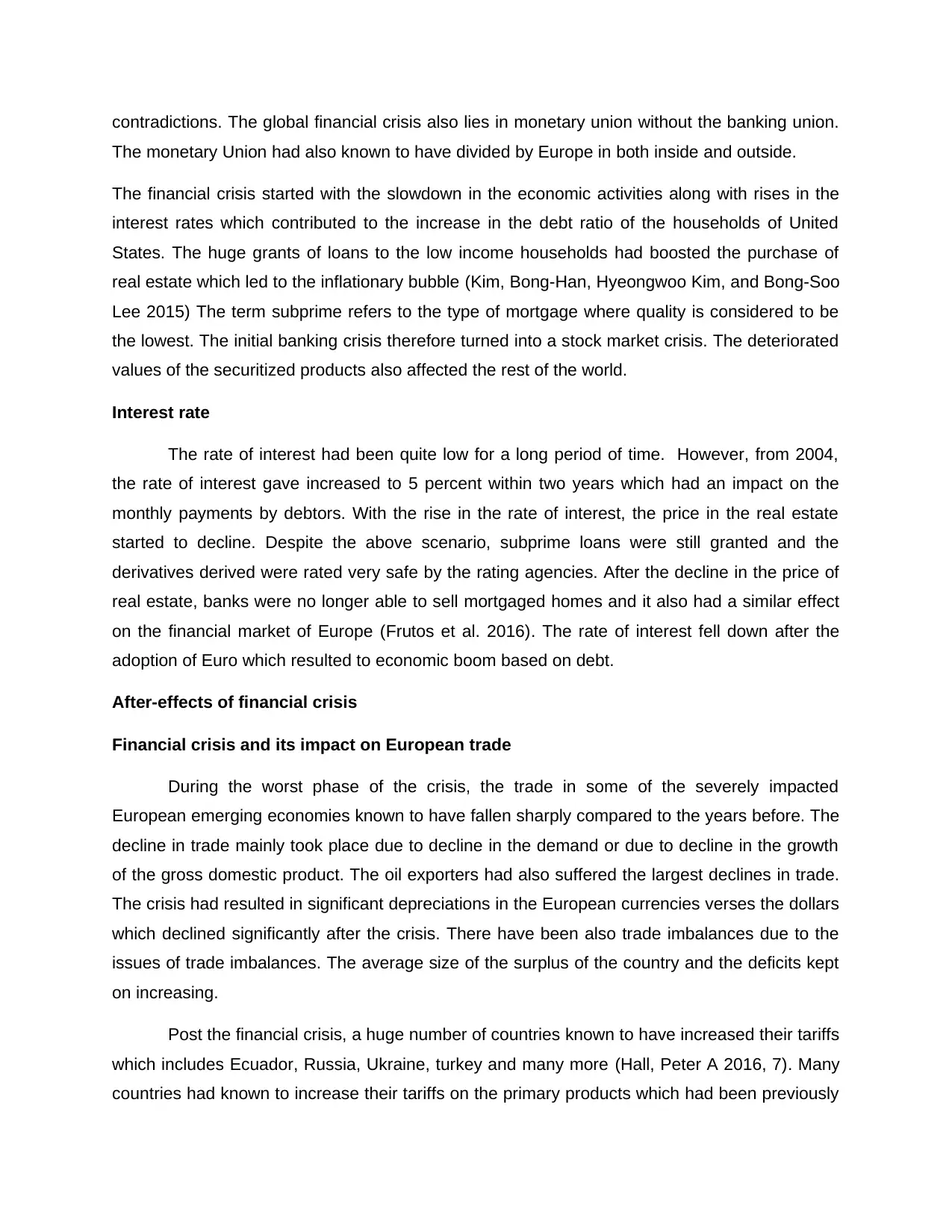
contradictions. The global financial crisis also lies in monetary union without the banking union.
The monetary Union had also known to have divided by Europe in both inside and outside.
The financial crisis started with the slowdown in the economic activities along with rises in the
interest rates which contributed to the increase in the debt ratio of the households of United
States. The huge grants of loans to the low income households had boosted the purchase of
real estate which led to the inflationary bubble (Kim, Bong-Han, Hyeongwoo Kim, and Bong-Soo
Lee 2015) The term subprime refers to the type of mortgage where quality is considered to be
the lowest. The initial banking crisis therefore turned into a stock market crisis. The deteriorated
values of the securitized products also affected the rest of the world.
Interest rate
The rate of interest had been quite low for a long period of time. However, from 2004,
the rate of interest gave increased to 5 percent within two years which had an impact on the
monthly payments by debtors. With the rise in the rate of interest, the price in the real estate
started to decline. Despite the above scenario, subprime loans were still granted and the
derivatives derived were rated very safe by the rating agencies. After the decline in the price of
real estate, banks were no longer able to sell mortgaged homes and it also had a similar effect
on the financial market of Europe (Frutos et al. 2016). The rate of interest fell down after the
adoption of Euro which resulted to economic boom based on debt.
After-effects of financial crisis
Financial crisis and its impact on European trade
During the worst phase of the crisis, the trade in some of the severely impacted
European emerging economies known to have fallen sharply compared to the years before. The
decline in trade mainly took place due to decline in the demand or due to decline in the growth
of the gross domestic product. The oil exporters had also suffered the largest declines in trade.
The crisis had resulted in significant depreciations in the European currencies verses the dollars
which declined significantly after the crisis. There have been also trade imbalances due to the
issues of trade imbalances. The average size of the surplus of the country and the deficits kept
on increasing.
Post the financial crisis, a huge number of countries known to have increased their tariffs
which includes Ecuador, Russia, Ukraine, turkey and many more (Hall, Peter A 2016, 7). Many
countries had known to increase their tariffs on the primary products which had been previously
The monetary Union had also known to have divided by Europe in both inside and outside.
The financial crisis started with the slowdown in the economic activities along with rises in the
interest rates which contributed to the increase in the debt ratio of the households of United
States. The huge grants of loans to the low income households had boosted the purchase of
real estate which led to the inflationary bubble (Kim, Bong-Han, Hyeongwoo Kim, and Bong-Soo
Lee 2015) The term subprime refers to the type of mortgage where quality is considered to be
the lowest. The initial banking crisis therefore turned into a stock market crisis. The deteriorated
values of the securitized products also affected the rest of the world.
Interest rate
The rate of interest had been quite low for a long period of time. However, from 2004,
the rate of interest gave increased to 5 percent within two years which had an impact on the
monthly payments by debtors. With the rise in the rate of interest, the price in the real estate
started to decline. Despite the above scenario, subprime loans were still granted and the
derivatives derived were rated very safe by the rating agencies. After the decline in the price of
real estate, banks were no longer able to sell mortgaged homes and it also had a similar effect
on the financial market of Europe (Frutos et al. 2016). The rate of interest fell down after the
adoption of Euro which resulted to economic boom based on debt.
After-effects of financial crisis
Financial crisis and its impact on European trade
During the worst phase of the crisis, the trade in some of the severely impacted
European emerging economies known to have fallen sharply compared to the years before. The
decline in trade mainly took place due to decline in the demand or due to decline in the growth
of the gross domestic product. The oil exporters had also suffered the largest declines in trade.
The crisis had resulted in significant depreciations in the European currencies verses the dollars
which declined significantly after the crisis. There have been also trade imbalances due to the
issues of trade imbalances. The average size of the surplus of the country and the deficits kept
on increasing.
Post the financial crisis, a huge number of countries known to have increased their tariffs
which includes Ecuador, Russia, Ukraine, turkey and many more (Hall, Peter A 2016, 7). Many
countries had known to increase their tariffs on the primary products which had been previously
Paraphrase This Document
Need a fresh take? Get an instant paraphrase of this document with our AI Paraphraser
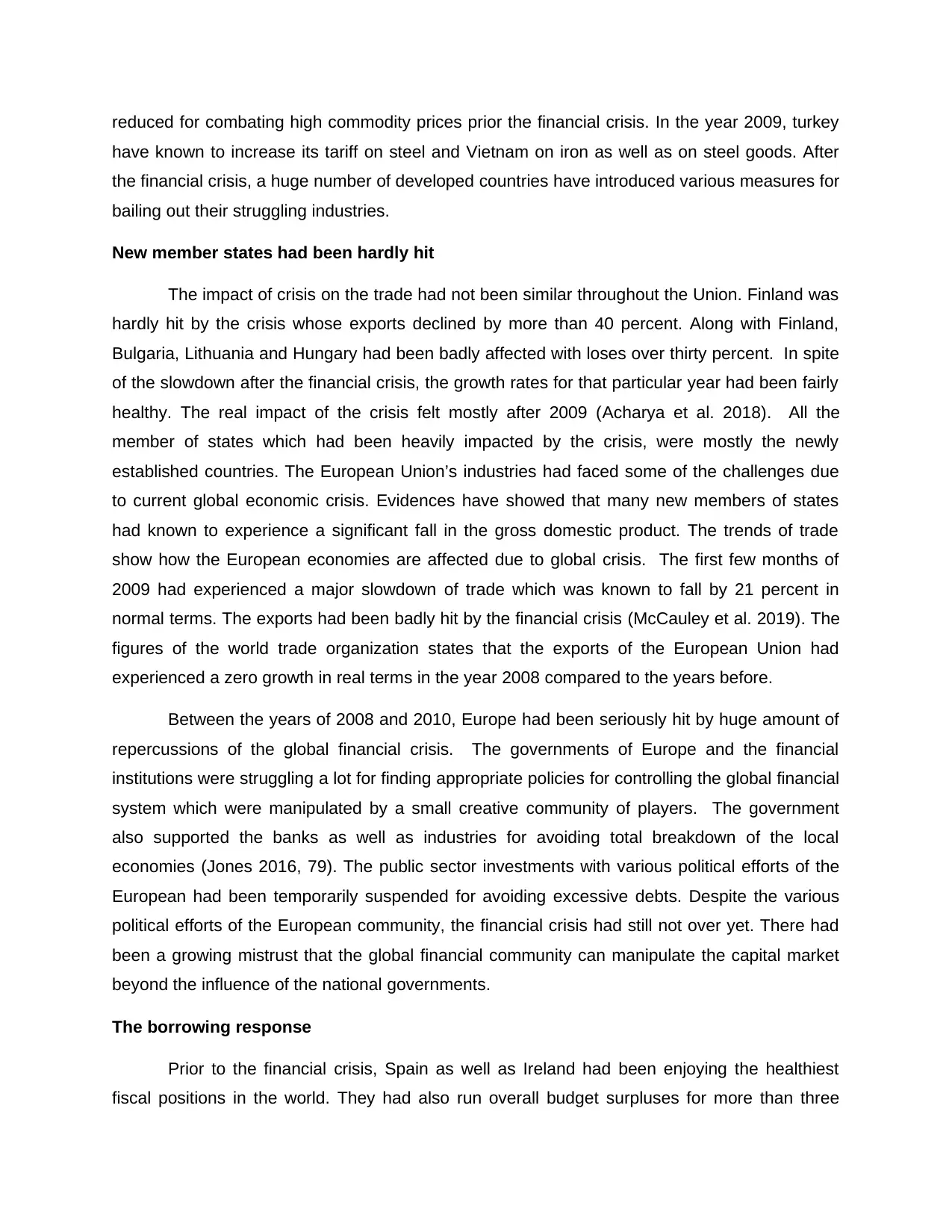
reduced for combating high commodity prices prior the financial crisis. In the year 2009, turkey
have known to increase its tariff on steel and Vietnam on iron as well as on steel goods. After
the financial crisis, a huge number of developed countries have introduced various measures for
bailing out their struggling industries.
New member states had been hardly hit
The impact of crisis on the trade had not been similar throughout the Union. Finland was
hardly hit by the crisis whose exports declined by more than 40 percent. Along with Finland,
Bulgaria, Lithuania and Hungary had been badly affected with loses over thirty percent. In spite
of the slowdown after the financial crisis, the growth rates for that particular year had been fairly
healthy. The real impact of the crisis felt mostly after 2009 (Acharya et al. 2018). All the
member of states which had been heavily impacted by the crisis, were mostly the newly
established countries. The European Union’s industries had faced some of the challenges due
to current global economic crisis. Evidences have showed that many new members of states
had known to experience a significant fall in the gross domestic product. The trends of trade
show how the European economies are affected due to global crisis. The first few months of
2009 had experienced a major slowdown of trade which was known to fall by 21 percent in
normal terms. The exports had been badly hit by the financial crisis (McCauley et al. 2019). The
figures of the world trade organization states that the exports of the European Union had
experienced a zero growth in real terms in the year 2008 compared to the years before.
Between the years of 2008 and 2010, Europe had been seriously hit by huge amount of
repercussions of the global financial crisis. The governments of Europe and the financial
institutions were struggling a lot for finding appropriate policies for controlling the global financial
system which were manipulated by a small creative community of players. The government
also supported the banks as well as industries for avoiding total breakdown of the local
economies (Jones 2016, 79). The public sector investments with various political efforts of the
European had been temporarily suspended for avoiding excessive debts. Despite the various
political efforts of the European community, the financial crisis had still not over yet. There had
been a growing mistrust that the global financial community can manipulate the capital market
beyond the influence of the national governments.
The borrowing response
Prior to the financial crisis, Spain as well as Ireland had been enjoying the healthiest
fiscal positions in the world. They had also run overall budget surpluses for more than three
have known to increase its tariff on steel and Vietnam on iron as well as on steel goods. After
the financial crisis, a huge number of developed countries have introduced various measures for
bailing out their struggling industries.
New member states had been hardly hit
The impact of crisis on the trade had not been similar throughout the Union. Finland was
hardly hit by the crisis whose exports declined by more than 40 percent. Along with Finland,
Bulgaria, Lithuania and Hungary had been badly affected with loses over thirty percent. In spite
of the slowdown after the financial crisis, the growth rates for that particular year had been fairly
healthy. The real impact of the crisis felt mostly after 2009 (Acharya et al. 2018). All the
member of states which had been heavily impacted by the crisis, were mostly the newly
established countries. The European Union’s industries had faced some of the challenges due
to current global economic crisis. Evidences have showed that many new members of states
had known to experience a significant fall in the gross domestic product. The trends of trade
show how the European economies are affected due to global crisis. The first few months of
2009 had experienced a major slowdown of trade which was known to fall by 21 percent in
normal terms. The exports had been badly hit by the financial crisis (McCauley et al. 2019). The
figures of the world trade organization states that the exports of the European Union had
experienced a zero growth in real terms in the year 2008 compared to the years before.
Between the years of 2008 and 2010, Europe had been seriously hit by huge amount of
repercussions of the global financial crisis. The governments of Europe and the financial
institutions were struggling a lot for finding appropriate policies for controlling the global financial
system which were manipulated by a small creative community of players. The government
also supported the banks as well as industries for avoiding total breakdown of the local
economies (Jones 2016, 79). The public sector investments with various political efforts of the
European had been temporarily suspended for avoiding excessive debts. Despite the various
political efforts of the European community, the financial crisis had still not over yet. There had
been a growing mistrust that the global financial community can manipulate the capital market
beyond the influence of the national governments.
The borrowing response
Prior to the financial crisis, Spain as well as Ireland had been enjoying the healthiest
fiscal positions in the world. They had also run overall budget surpluses for more than three
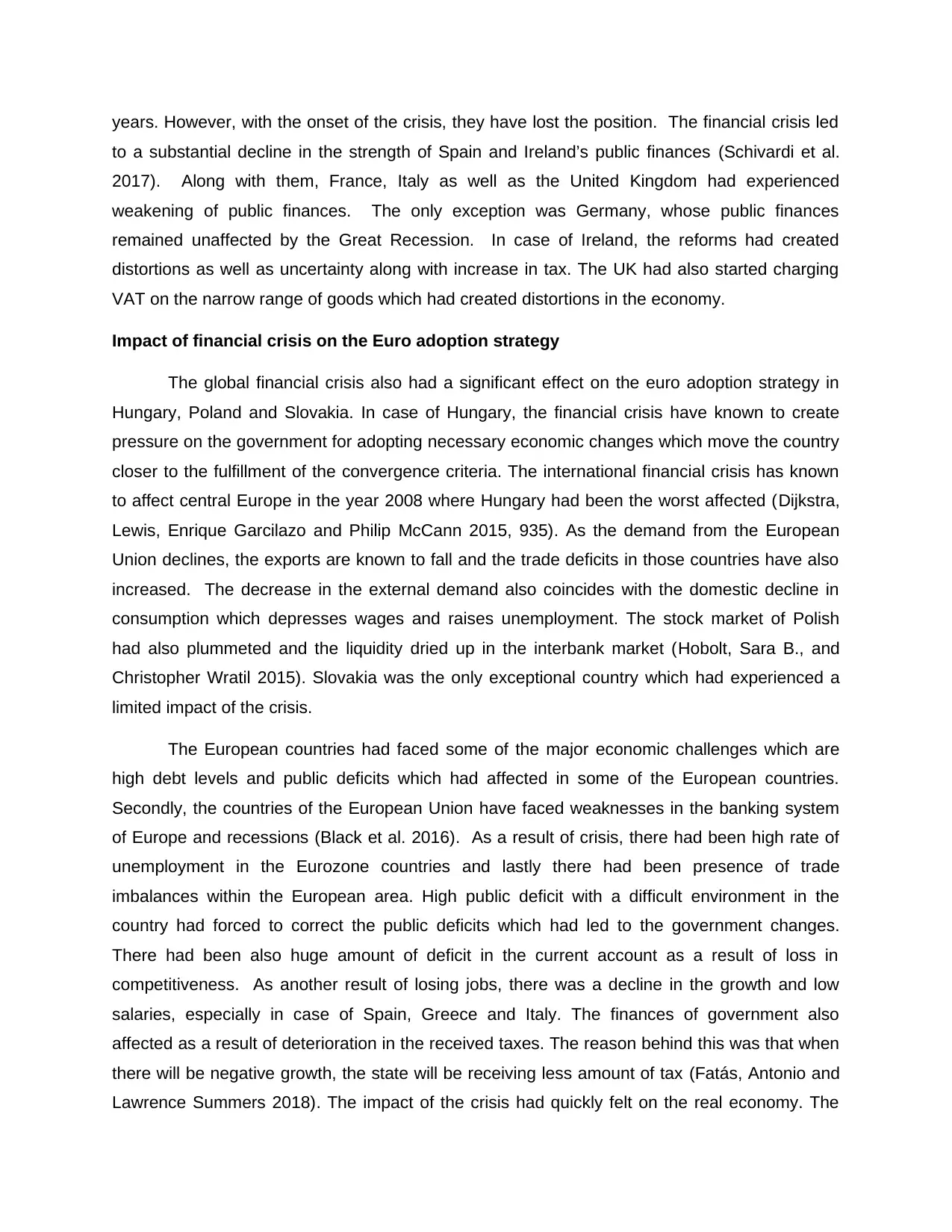
years. However, with the onset of the crisis, they have lost the position. The financial crisis led
to a substantial decline in the strength of Spain and Ireland’s public finances (Schivardi et al.
2017). Along with them, France, Italy as well as the United Kingdom had experienced
weakening of public finances. The only exception was Germany, whose public finances
remained unaffected by the Great Recession. In case of Ireland, the reforms had created
distortions as well as uncertainty along with increase in tax. The UK had also started charging
VAT on the narrow range of goods which had created distortions in the economy.
Impact of financial crisis on the Euro adoption strategy
The global financial crisis also had a significant effect on the euro adoption strategy in
Hungary, Poland and Slovakia. In case of Hungary, the financial crisis have known to create
pressure on the government for adopting necessary economic changes which move the country
closer to the fulfillment of the convergence criteria. The international financial crisis has known
to affect central Europe in the year 2008 where Hungary had been the worst affected (Dijkstra,
Lewis, Enrique Garcilazo and Philip McCann 2015, 935). As the demand from the European
Union declines, the exports are known to fall and the trade deficits in those countries have also
increased. The decrease in the external demand also coincides with the domestic decline in
consumption which depresses wages and raises unemployment. The stock market of Polish
had also plummeted and the liquidity dried up in the interbank market (Hobolt, Sara B., and
Christopher Wratil 2015). Slovakia was the only exceptional country which had experienced a
limited impact of the crisis.
The European countries had faced some of the major economic challenges which are
high debt levels and public deficits which had affected in some of the European countries.
Secondly, the countries of the European Union have faced weaknesses in the banking system
of Europe and recessions (Black et al. 2016). As a result of crisis, there had been high rate of
unemployment in the Eurozone countries and lastly there had been presence of trade
imbalances within the European area. High public deficit with a difficult environment in the
country had forced to correct the public deficits which had led to the government changes.
There had been also huge amount of deficit in the current account as a result of loss in
competitiveness. As another result of losing jobs, there was a decline in the growth and low
salaries, especially in case of Spain, Greece and Italy. The finances of government also
affected as a result of deterioration in the received taxes. The reason behind this was that when
there will be negative growth, the state will be receiving less amount of tax (Fatás, Antonio and
Lawrence Summers 2018). The impact of the crisis had quickly felt on the real economy. The
to a substantial decline in the strength of Spain and Ireland’s public finances (Schivardi et al.
2017). Along with them, France, Italy as well as the United Kingdom had experienced
weakening of public finances. The only exception was Germany, whose public finances
remained unaffected by the Great Recession. In case of Ireland, the reforms had created
distortions as well as uncertainty along with increase in tax. The UK had also started charging
VAT on the narrow range of goods which had created distortions in the economy.
Impact of financial crisis on the Euro adoption strategy
The global financial crisis also had a significant effect on the euro adoption strategy in
Hungary, Poland and Slovakia. In case of Hungary, the financial crisis have known to create
pressure on the government for adopting necessary economic changes which move the country
closer to the fulfillment of the convergence criteria. The international financial crisis has known
to affect central Europe in the year 2008 where Hungary had been the worst affected (Dijkstra,
Lewis, Enrique Garcilazo and Philip McCann 2015, 935). As the demand from the European
Union declines, the exports are known to fall and the trade deficits in those countries have also
increased. The decrease in the external demand also coincides with the domestic decline in
consumption which depresses wages and raises unemployment. The stock market of Polish
had also plummeted and the liquidity dried up in the interbank market (Hobolt, Sara B., and
Christopher Wratil 2015). Slovakia was the only exceptional country which had experienced a
limited impact of the crisis.
The European countries had faced some of the major economic challenges which are
high debt levels and public deficits which had affected in some of the European countries.
Secondly, the countries of the European Union have faced weaknesses in the banking system
of Europe and recessions (Black et al. 2016). As a result of crisis, there had been high rate of
unemployment in the Eurozone countries and lastly there had been presence of trade
imbalances within the European area. High public deficit with a difficult environment in the
country had forced to correct the public deficits which had led to the government changes.
There had been also huge amount of deficit in the current account as a result of loss in
competitiveness. As another result of losing jobs, there was a decline in the growth and low
salaries, especially in case of Spain, Greece and Italy. The finances of government also
affected as a result of deterioration in the received taxes. The reason behind this was that when
there will be negative growth, the state will be receiving less amount of tax (Fatás, Antonio and
Lawrence Summers 2018). The impact of the crisis had quickly felt on the real economy. The
⊘ This is a preview!⊘
Do you want full access?
Subscribe today to unlock all pages.

Trusted by 1+ million students worldwide
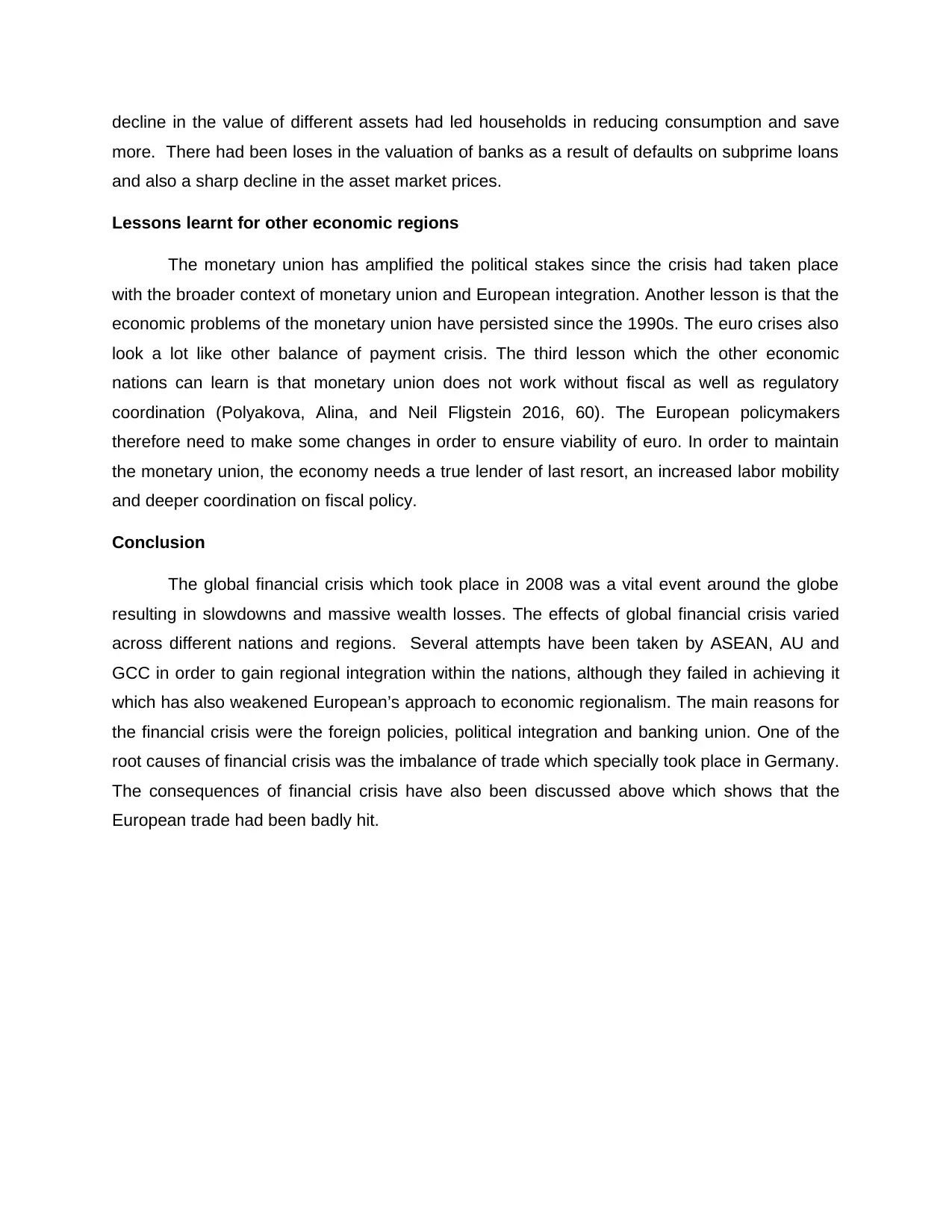
decline in the value of different assets had led households in reducing consumption and save
more. There had been loses in the valuation of banks as a result of defaults on subprime loans
and also a sharp decline in the asset market prices.
Lessons learnt for other economic regions
The monetary union has amplified the political stakes since the crisis had taken place
with the broader context of monetary union and European integration. Another lesson is that the
economic problems of the monetary union have persisted since the 1990s. The euro crises also
look a lot like other balance of payment crisis. The third lesson which the other economic
nations can learn is that monetary union does not work without fiscal as well as regulatory
coordination (Polyakova, Alina, and Neil Fligstein 2016, 60). The European policymakers
therefore need to make some changes in order to ensure viability of euro. In order to maintain
the monetary union, the economy needs a true lender of last resort, an increased labor mobility
and deeper coordination on fiscal policy.
Conclusion
The global financial crisis which took place in 2008 was a vital event around the globe
resulting in slowdowns and massive wealth losses. The effects of global financial crisis varied
across different nations and regions. Several attempts have been taken by ASEAN, AU and
GCC in order to gain regional integration within the nations, although they failed in achieving it
which has also weakened European’s approach to economic regionalism. The main reasons for
the financial crisis were the foreign policies, political integration and banking union. One of the
root causes of financial crisis was the imbalance of trade which specially took place in Germany.
The consequences of financial crisis have also been discussed above which shows that the
European trade had been badly hit.
more. There had been loses in the valuation of banks as a result of defaults on subprime loans
and also a sharp decline in the asset market prices.
Lessons learnt for other economic regions
The monetary union has amplified the political stakes since the crisis had taken place
with the broader context of monetary union and European integration. Another lesson is that the
economic problems of the monetary union have persisted since the 1990s. The euro crises also
look a lot like other balance of payment crisis. The third lesson which the other economic
nations can learn is that monetary union does not work without fiscal as well as regulatory
coordination (Polyakova, Alina, and Neil Fligstein 2016, 60). The European policymakers
therefore need to make some changes in order to ensure viability of euro. In order to maintain
the monetary union, the economy needs a true lender of last resort, an increased labor mobility
and deeper coordination on fiscal policy.
Conclusion
The global financial crisis which took place in 2008 was a vital event around the globe
resulting in slowdowns and massive wealth losses. The effects of global financial crisis varied
across different nations and regions. Several attempts have been taken by ASEAN, AU and
GCC in order to gain regional integration within the nations, although they failed in achieving it
which has also weakened European’s approach to economic regionalism. The main reasons for
the financial crisis were the foreign policies, political integration and banking union. One of the
root causes of financial crisis was the imbalance of trade which specially took place in Germany.
The consequences of financial crisis have also been discussed above which shows that the
European trade had been badly hit.
Paraphrase This Document
Need a fresh take? Get an instant paraphrase of this document with our AI Paraphraser
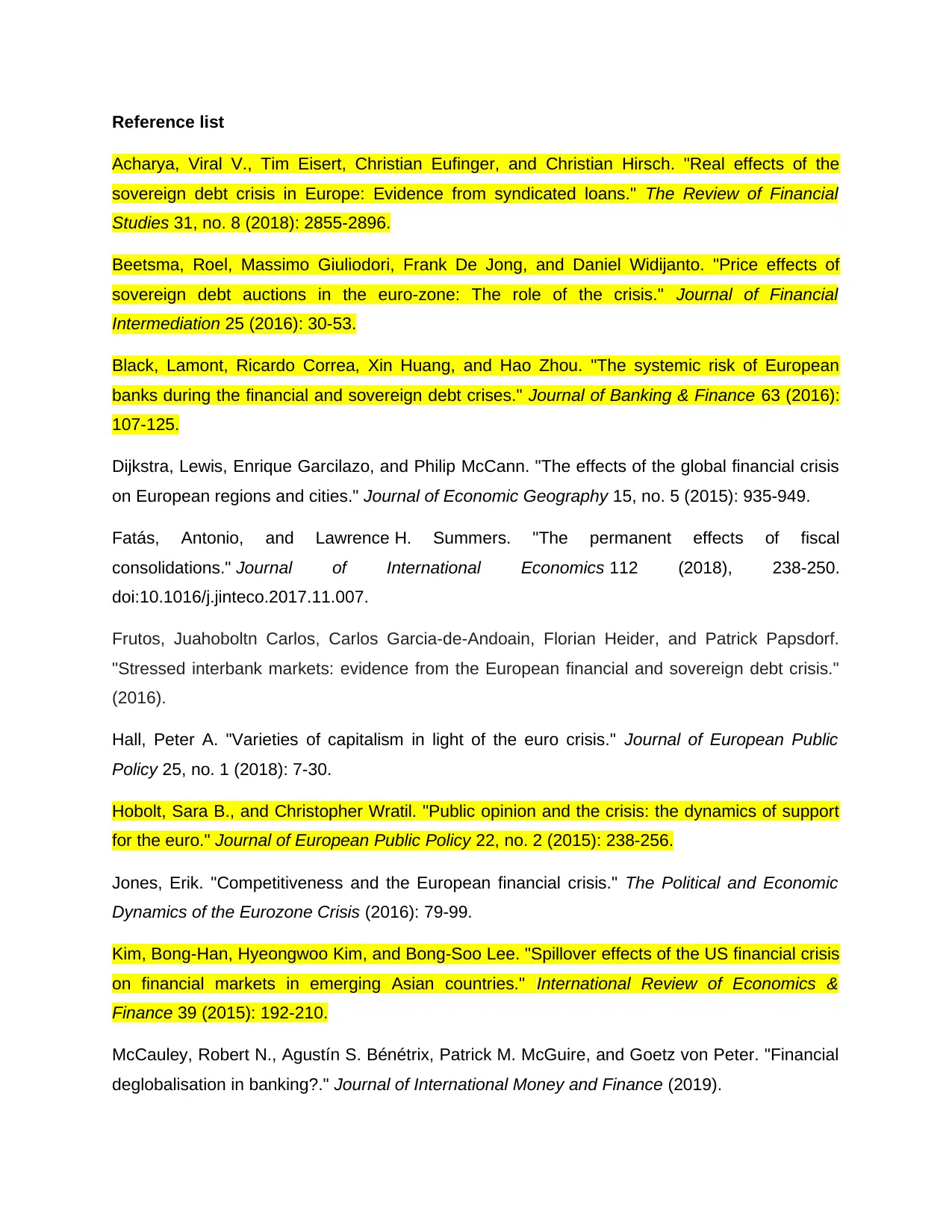
Reference list
Acharya, Viral V., Tim Eisert, Christian Eufinger, and Christian Hirsch. "Real effects of the
sovereign debt crisis in Europe: Evidence from syndicated loans." The Review of Financial
Studies 31, no. 8 (2018): 2855-2896.
Beetsma, Roel, Massimo Giuliodori, Frank De Jong, and Daniel Widijanto. "Price effects of
sovereign debt auctions in the euro-zone: The role of the crisis." Journal of Financial
Intermediation 25 (2016): 30-53.
Black, Lamont, Ricardo Correa, Xin Huang, and Hao Zhou. "The systemic risk of European
banks during the financial and sovereign debt crises." Journal of Banking & Finance 63 (2016):
107-125.
Dijkstra, Lewis, Enrique Garcilazo, and Philip McCann. "The effects of the global financial crisis
on European regions and cities." Journal of Economic Geography 15, no. 5 (2015): 935-949.
Fatás, Antonio, and Lawrence H. Summers. "The permanent effects of fiscal
consolidations." Journal of International Economics 112 (2018), 238-250.
doi:10.1016/j.jinteco.2017.11.007.
Frutos, Juahoboltn Carlos, Carlos Garcia-de-Andoain, Florian Heider, and Patrick Papsdorf.
"Stressed interbank markets: evidence from the European financial and sovereign debt crisis."
(2016).
Hall, Peter A. "Varieties of capitalism in light of the euro crisis." Journal of European Public
Policy 25, no. 1 (2018): 7-30.
Hobolt, Sara B., and Christopher Wratil. "Public opinion and the crisis: the dynamics of support
for the euro." Journal of European Public Policy 22, no. 2 (2015): 238-256.
Jones, Erik. "Competitiveness and the European financial crisis." The Political and Economic
Dynamics of the Eurozone Crisis (2016): 79-99.
Kim, Bong-Han, Hyeongwoo Kim, and Bong-Soo Lee. "Spillover effects of the US financial crisis
on financial markets in emerging Asian countries." International Review of Economics &
Finance 39 (2015): 192-210.
McCauley, Robert N., Agustín S. Bénétrix, Patrick M. McGuire, and Goetz von Peter. "Financial
deglobalisation in banking?." Journal of International Money and Finance (2019).
Acharya, Viral V., Tim Eisert, Christian Eufinger, and Christian Hirsch. "Real effects of the
sovereign debt crisis in Europe: Evidence from syndicated loans." The Review of Financial
Studies 31, no. 8 (2018): 2855-2896.
Beetsma, Roel, Massimo Giuliodori, Frank De Jong, and Daniel Widijanto. "Price effects of
sovereign debt auctions in the euro-zone: The role of the crisis." Journal of Financial
Intermediation 25 (2016): 30-53.
Black, Lamont, Ricardo Correa, Xin Huang, and Hao Zhou. "The systemic risk of European
banks during the financial and sovereign debt crises." Journal of Banking & Finance 63 (2016):
107-125.
Dijkstra, Lewis, Enrique Garcilazo, and Philip McCann. "The effects of the global financial crisis
on European regions and cities." Journal of Economic Geography 15, no. 5 (2015): 935-949.
Fatás, Antonio, and Lawrence H. Summers. "The permanent effects of fiscal
consolidations." Journal of International Economics 112 (2018), 238-250.
doi:10.1016/j.jinteco.2017.11.007.
Frutos, Juahoboltn Carlos, Carlos Garcia-de-Andoain, Florian Heider, and Patrick Papsdorf.
"Stressed interbank markets: evidence from the European financial and sovereign debt crisis."
(2016).
Hall, Peter A. "Varieties of capitalism in light of the euro crisis." Journal of European Public
Policy 25, no. 1 (2018): 7-30.
Hobolt, Sara B., and Christopher Wratil. "Public opinion and the crisis: the dynamics of support
for the euro." Journal of European Public Policy 22, no. 2 (2015): 238-256.
Jones, Erik. "Competitiveness and the European financial crisis." The Political and Economic
Dynamics of the Eurozone Crisis (2016): 79-99.
Kim, Bong-Han, Hyeongwoo Kim, and Bong-Soo Lee. "Spillover effects of the US financial crisis
on financial markets in emerging Asian countries." International Review of Economics &
Finance 39 (2015): 192-210.
McCauley, Robert N., Agustín S. Bénétrix, Patrick M. McGuire, and Goetz von Peter. "Financial
deglobalisation in banking?." Journal of International Money and Finance (2019).

Polyakova, Alina, and Neil Fligstein. "Is European integration causing Europe to become more
nationalist? Evidence from the 2007–9 financial crisis." Journal of European Public Policy 23,
no. 1 (2016): 60-83.
Schivardi, Fabiano, Enrico Sette, and Guido Tabellini. "Credit Misallocation During the
European Financial Crisis." SSRN Electronic Journal, 2017. doi:10.2139/ssrn.2930804.
nationalist? Evidence from the 2007–9 financial crisis." Journal of European Public Policy 23,
no. 1 (2016): 60-83.
Schivardi, Fabiano, Enrico Sette, and Guido Tabellini. "Credit Misallocation During the
European Financial Crisis." SSRN Electronic Journal, 2017. doi:10.2139/ssrn.2930804.
⊘ This is a preview!⊘
Do you want full access?
Subscribe today to unlock all pages.

Trusted by 1+ million students worldwide
1 out of 9
Related Documents
Your All-in-One AI-Powered Toolkit for Academic Success.
+13062052269
info@desklib.com
Available 24*7 on WhatsApp / Email
![[object Object]](/_next/static/media/star-bottom.7253800d.svg)
Unlock your academic potential
Copyright © 2020–2026 A2Z Services. All Rights Reserved. Developed and managed by ZUCOL.





